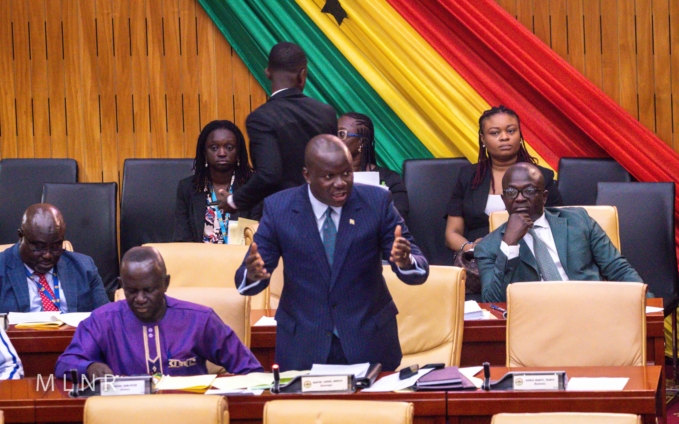Damongo MP Samuel Abdulai Jinapor has raised concerns over the President’s claim of reducing the size of government by appointing only 60 ministers and deputy ministers.
According to him, while this move has been presented as a step toward efficiency, government has merely shifted appointments to the Office of the President, maintaining the same cost burden on the national exchequer.
Jinapor pointed out that while the President celebrates the reduction in the number of Ministers, he has simultaneously expanded the list of Presidential Advisors, Staffers, and Aides - many of whom enjoy the same benefits as Ministers but do not undergo parliamentary approval.
“The President is praising himself for appointing 60 Ministers, but what he has failed to tell us is that he has found a smart way of making up the numbers by appointing more and more people as Presidential Advisors and Staffers,” he stated.
By convention, these appointments carry the same rankings and benefits as Ministers, he argued.
"The Chief of Staff is ranked just below the Speaker of Parliament but above a Cabinet Minister. Senior Presidential Advisors receive the same emoluments as Cabinet Ministers.
"Presidential Advisors are pegged at the same level as Cabinet Ministers who are not MPs, while Presidential Aides are treated as Deputy Ministers, with corresponding benefits."
He argued that the collapse of certain Ministries has not led to cost savings, as their functions have simply been transferred to the Office of the President with the same financial implications.
Mr Jinapor noted that the Office of the President now houses an increasing number of high-ranking appointees, including one Senior Presidential Advisor on Government Affairs, Dr. Valerie Sawyerr, and nearly 10 Presidential Advisors covering various sectors, including the economy, corruption, and diaspora affairs.
"There are also dozens of Presidential Staffers and Aides, assigned to specialised roles such as Economic Affairs, Special Aides to the President and Vice President, and regional operations.
"Notably, there is even a Director at the Presidency in charge of Agriculture and Agribusiness (Peter Boamah Otukonor), despite the existence of the Ministry of Food and Agriculture and the Ministry of Trade, Agribusiness, and Industry," he stated.
He noted that this pattern suggests a strategy of political accommodation - where every major campaign promise is accompanied by a new Presidential Advisor or Staffer.
The former Lands Minister further highlighted that while the President has maintained that he will not appoint Deputy Regional Ministers, a policy first introduced by President Akufo-Addo, he has instead appointed 16 Presidential Staffers, each assigned to a region.
He questioned whether these individuals are simply Deputy Regional Ministers under a different title.
Raising further concerns about the oversized communications team within the Office of the President, Mr Jinapor revealed that the team currently includes one Presidential Advisor on Media, four Directors of Communication, five Deputy Directors of Communication, two Communication Specialists, five Technical Communication Assistants, one Media Aide, one Assistant Media Liaison Officer, one Communications Consultant, and one Minister for Government Communications.
The former Minister questioned the necessity of having twenty 20 communication-related appointees, stating, “What at all are they going to communicate?”
Beyond concerns over government size and cost, Mr Jinapor stated that the President has failed to uphold key campaign pledges.
One major unfulfilled promise, he said, is the commitment to appoint 30% of Cabinet Ministers as women—a goal that remains unmet.
“If you can’t keep the campaign promise, just let the Ghanaian people know and apologise to them,” he asserted.
“Don’t use the backdoor to appoint Ministers and Deputy Ministers who will not be subject to parliamentary approval.”
Samuel Jinapor concluded that while the President’s move to limit the number of Ministers appears positive on the surface, the financial burden on the state remains unchanged.
The MP argued that shifting roles from Ministries to the Office of the President does not equate to cost savings, raising concerns about transparency and accountability.
He urged the government to be candid with the Ghanaian people, stating that they will be watching closely to see whether this restructuring truly delivers on its promise of efficiency or is simply a case of repackaging old structures under new titles.
Latest Stories
-
NDC USA appeals to President Mahama to appoint diaspora members into government
4 minutes -
Global perception of Ghana improving under Mahama’s leadership – NDC USA Chair
14 minutes -
Bagbin repremands Dr. Afriyie but spares him from Privileges Committee
18 minutes -
Ablekuma North: Valerie Sawyerr urges EC to rerun outstanding constituency polls
1 hour -
AngloGold Ashanti Obuasi Mine tackles plastic pollution with inclusive community initiatives
1 hour -
GAUA-KNUST inaugural week celebrates innovation in university administration
1 hour -
ThisAbledSeries: 10-year-old girl becomes her deaf parents’ lifeline amid poverty and prejudice
1 hour -
VRA kicks off its annual EPP/EMP sensitisation workshop in Eastern Region
1 hour -
Don’t suffer in silence: Unpacking the choice fistula didn’t give aspiring mothers
2 hours -
Western Regional Minister orders formation of T&A Park Management committee amid controversy
2 hours -
Why only satellites, drones and AI can stop galamsey now
2 hours -
The legal drama of a ‘wanted’ man – IMANI
2 hours -
When scrutiny turns into siege: An open letter to the Vice President
2 hours -
The time is now- Prez Mahama urges action to drive Ghana’s productive economy
2 hours -
Elon Musk says he regrets some posts about Donald Trump
2 hours

